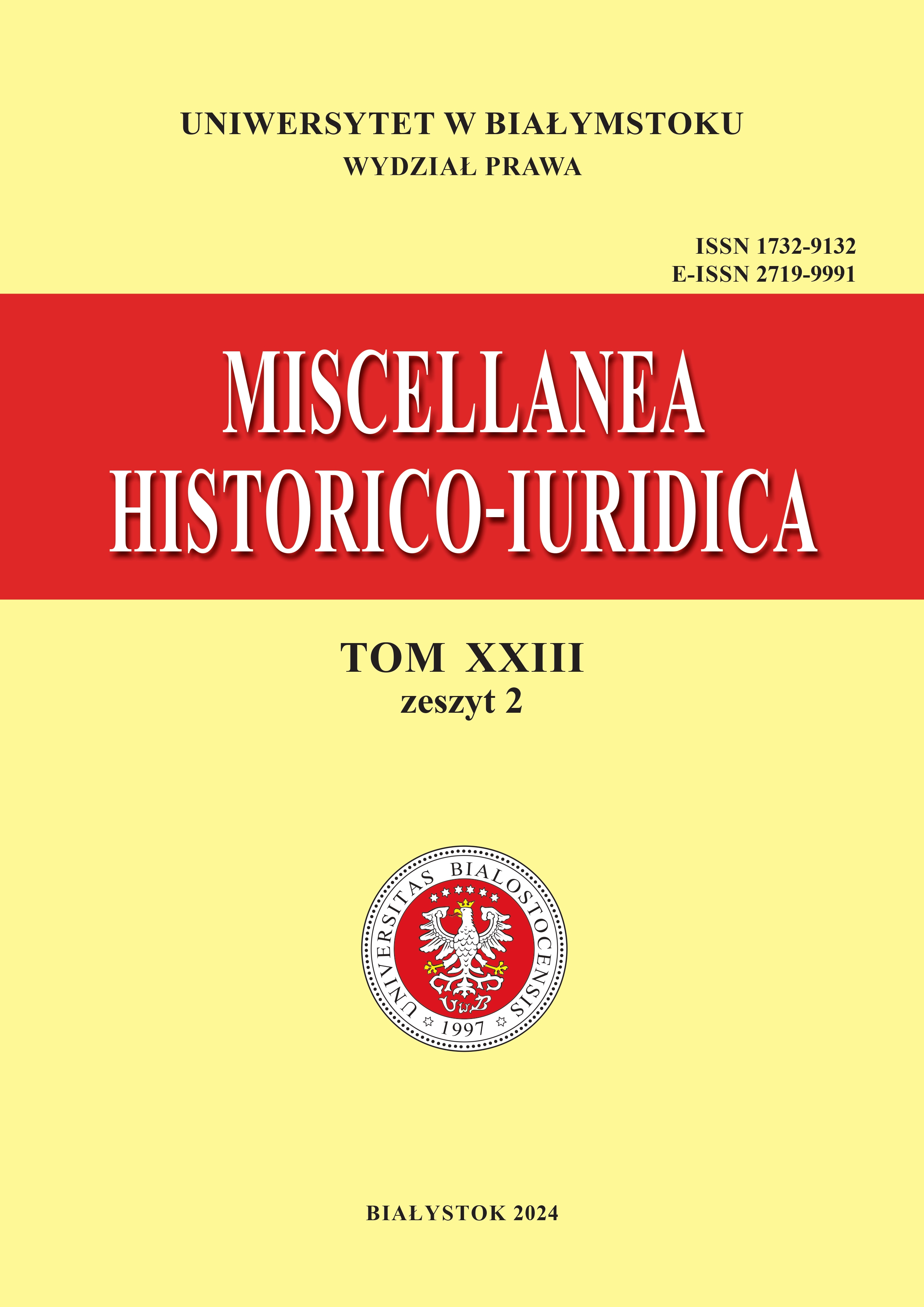The Tendency to Narrow the Categories of People on the Basis on Professional Pragmatics – Discussion Around the Teacher's Charter. Socio-pedagogical and Legal Perspective
Keywords:
labor law, educational law, critical pedagogy, interdisciplinary studies, legal and social perspective, Teachers' Charter, degradation of the profession of teacher and pedagogueAbstract
This study is interdisciplinary in nature, combining the author’s experiences and interests, which include issues related to labor law and broadly understood socio-pedagogical issues. It was at the intersection of two scientific disciplines (law and pedagogy) that a research problem was identified regarding the authorities’ developing tendency to exclude subsequent groups of employees from the Teacher’s Charter. Therefore, the research goal of this article is to reconstruct and describe the manifestations of the tendency in question to narrow down the categories of people performing teaching professions whose employment relationship is regulated by the provisions of the Teacher’s Charter and to outline the possible consequences of the tendency. The main problem axis of the study is the key aspect of the functioning of the teachers’ professional pragmatics of the Teacher’s Charter, which is omitted both in the scientific and journalistic works. In the scientific discourse on pedagogy and law, the problem of the tendency to narrow down the categories of people covered by professional pragmatics does not exist. This has consequences for pedagogical practice and for the broadly understood educational reality.
The aim of this study is to draw attention to the changes in the basic education act that have already been made and to one of the draft changes that has not been introduced, but it is still being discussed and has gained considerable approval. Above all, the aim of this study is to draw the reader’s attention to the issues absent in legal and pedagogical circles, with particular emphasis on their social and educational consequences. The pretext of caring about staff shortages (which are currently very real and severe), was used as an effective way to reduce employee costs. At the same time, however, this method provokes a number of consequences that focus on reducing the quality of educational services: education, upbringing and care. The article presents a critical socio-pedagogical and legal perspective, thanks to which readers can gain a broader view of the problem. For the purposes of the text, the method of analyzing secondary sources was used, analyzing the legal texts that were the subject of the study. Journalistic texts and ethnographic threads, resulting from the author’s experience as an academic lecturer and a researcher of educational and social reality, were also included in the narrative.
References
Ustawa z dnia 1 lipca 1926 roku o stosunkach służbowych nauczycieli (tj. Dz.U. 1932 nr 104, poz. 873).
Ustawa dnia 27 kwietnia 1956 r. o prawach i obowiązkach nauczycieli (Dz.U. 1956 nr 12, poz. 63).
Ustawa z dnia 27 kwietnia 1972 r. Karta praw i obowiązków nauczyciela (Dz.U. 1972 nr 16, poz. 114).
Ustawa z dnia 26 czerwca 1974 r. Kodeks pracy (t.j. Dz.U. 2022, poz. 1510, z późn. zm.).
Ustawa z dnia 26 stycznia 1982 r. Karta Nauczyciela (t.j. Dz.U. 2023, poz. 984).
Ustawa z dnia 12 marca 2004 r. o pomocy społecznej (t.j. Dz.U. 2023, poz. 901).
Ustawa z dnia 9 czerwca 2011 r. o wspieraniu rodziny i systemie pieczy zastępczej (t.j. Dz.U. 2022, poz. 447, z późn. zm.)
Ustawa z dnia 5 sierpnia 2015 r. o opiniodawczych zespołach sądowych specjalistów (t.j. Dz.U. 2018, poz. 708, z późn. zm.).
Ustawa z dnia 14 grudnia 2016 r. – Prawo oświatowe (t.j. Dz.U. 2023, poz. 900).
Rozporządzenie Ministra Nauki i Szkolnictwa Wyższego z dnia 25 lipca 2019 r. w sprawie standardu kształcenia przygotowującego do wykonywania zawodu nauczyciela (Dz.U. 2019, poz. 1450).
Gawroński Krzysztof, Art. 1, [w:] Artur Olszewski, Beata Zajda, Krzysztof Gawroński, Karta Nauczyciela. Komentarz, Warszawa 2023.
Homplewicz Janusz, Polskie prawo szkolne. Zagadnienia podstawowe, Warszawa 1984.
Krasuski Józef, Historia wychowania. Zarys syntetyczny, Warszawa 1989.
Latoch‑Zielińska Małgorzata, Polski system kształcenia nauczycieli – historia i współczesność, „Z Teorii i Praktyki Dydaktycznej Języka Polskiego” 2023, t. 32.
Majewski Stanisław, Kształtowanie się systemu zarządzania oświatą w Polsce od XVIII do XX wieku (zarys historyczny), „Studia Pedagogiczne. Problemy Społeczne, Edukacyjne i Artystyczne” 2003, t. 14.
Nitecki Stanisław, Art. 237, [w:] Wilk Aleksandra, Nitecki Stanisław, Ustawa o wspieraniu rodziny i systemie pieczy zastępczej. Komentarz, LEX/el. 2021.
Tryniszewska Katarzyna, Art. 237, [w:] Ustawa o wspieraniu rodziny i systemie pieczy zastępczej. Komentarz, wyd. II, Warszawa 2015.
Co daje Karta i dlaczego jest tak ważnym dokumentem?, https://znp.edu.pl/co-daje-karta-i-dlaczego-jest-tak-waznym-dokumentem/.
Czy Lex Czarnek 2.0 otwiera furtkę do likwidacji Karty Nauczyciela w przedszkolach? Krzysztof Baszczyński: Bądźmy mądrzy przed szkodą, https://glos.pl/czy-lex-czarnek-2-0-otwiera-furtke-do-likwidacji-karty-nauczyciela-w-przedszkolach-krzysztof-baszczynski-badzmy-madrzy-przed-szkoda.
Druk nr 2710. Poselski projekt ustawy o zmianie ustawy - Prawo oświatowe oraz niektórych innych ustaw, https://www.sejm.gov.pl/sejm9.nsf/druk.xsp?nr=2710.
Poselski projekt ustawy o zmianie ustawy – Prawo oświatowe oraz niektórych innych ustaw, https://www.sejm.gov.pl/Sejm9.nsf/PrzebiegProc.xsp?id=9CDBBCB1C8E1A0F0C12588E200308ED9.
Powrót Lex Czarnek – nowy projekt nowelizacji Prawa oświatowego, https://www.portaloswiatowy.pl/top-tematy/powrot-lex-czarnek-nowy-projekt-nowelizacji-prawa-oswiatowego-22479.html.
Downloads
Published
Issue
Section
License
Copyright (c) 2024 Uniwersytet w Białymstoku (entire issue as a whole); Dagna Dejna (article)

This work is licensed under a Creative Commons Attribution-ShareAlike 4.0 International License.







